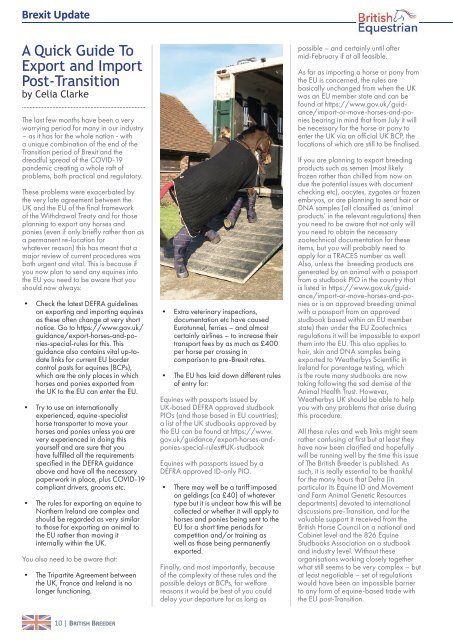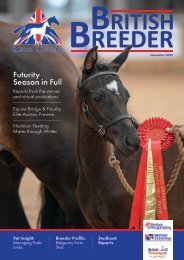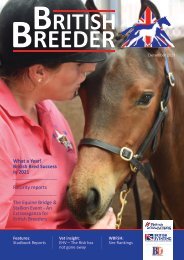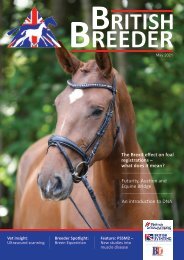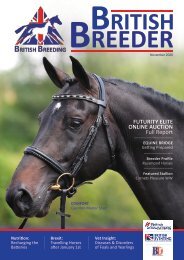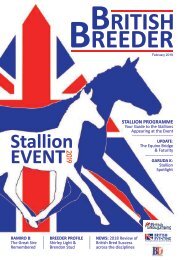British Breeder Magazine, February 2021
The most anticipated issue of the year, our February British Breeder magazine includes the Stallion Catalogue for the Virtual Stallion Event, to be held on 10th, 17th and 24th February. Visit our website for webinar registration details. Plus features on top breeders, veterinary insight, and much more.
The most anticipated issue of the year, our February British Breeder magazine includes the Stallion Catalogue for the Virtual Stallion Event, to be held on 10th, 17th and 24th February. Visit our website for webinar registration details. Plus features on top breeders, veterinary insight, and much more.
You also want an ePaper? Increase the reach of your titles
YUMPU automatically turns print PDFs into web optimized ePapers that Google loves.
Brexit Update<br />
A Quick Guide To<br />
Export and Import<br />
Post-Transition<br />
by Celia Clarke<br />
The last few months have been a very<br />
worrying period for many in our industry<br />
– as it has for the whole nation - with<br />
a unique combination of the end of the<br />
Transition period of Brexit and the<br />
dreadful spread of the COVID-19<br />
pandemic creating a whole raft of<br />
problems, both practical and regulatory.<br />
These problems were exacerbated by<br />
the very late agreement between the<br />
UK and the EU of the final framework<br />
of the Withdrawal Treaty and for those<br />
planning to export any horses and<br />
ponies (even if only briefly rather than as<br />
a permanent re-location for<br />
whatever reason) this has meant that a<br />
major review of current procedures was<br />
both urgent and vital. This is because if<br />
you now plan to send any equines into<br />
the EU you need to be aware that you<br />
should now always:<br />
• Check the latest DEFRA guidelines<br />
on exporting and importing equines<br />
as these often change at very short<br />
notice. Go to https://www.gov.uk/<br />
guidance/export-horses-and-ponies-special-rules<br />
for this. This<br />
guidance also contains vital up-todate<br />
links for current EU border<br />
control posts for equines (BCPs),<br />
which are the only places in which<br />
horses and ponies exported from<br />
the UK to the EU can enter the EU.<br />
• Try to use an internationally<br />
experienced, equine-specialist<br />
horse transporter to move your<br />
horses and ponies unless you are<br />
very experienced in doing this<br />
yourself and are sure that you<br />
have fulfilled all the requirements<br />
specified in the DEFRA guidance<br />
above and have all the necessary<br />
paperwork in place, plus COVID-19<br />
compliant drivers, grooms etc.<br />
• The rules for exporting an equine to<br />
Northern Ireland are complex and<br />
should be regarded as very similar<br />
to those for exporting an animal to<br />
the EU rather than moving it<br />
internally within the UK.<br />
You also need to be aware that:<br />
• The Tripartite Agreement between<br />
the UK, France and Ireland is no<br />
longer functioning.<br />
• Extra veterinary inspections,<br />
documentation etc have caused<br />
Eurotunnel, ferries – and almost<br />
certainly airlines – to increase their<br />
transport fees by as much as £400<br />
per horse per crossing in<br />
comparison to pre-Brexit rates.<br />
• The EU has laid down different rules<br />
of entry for:<br />
Equines with passports issued by<br />
UK-based DEFRA approved studbook<br />
PIOs (and those based in EU countries);<br />
a list of the UK studbooks approved by<br />
the EU can be found at https://www.<br />
gov.uk/guidance/export-horses-andponies-special-rules#UK-studbook<br />
Equines with passports issued by a<br />
DEFRA approved ID-only PIO.<br />
• There may well be a tariff imposed<br />
on geldings (ca £40) of whatever<br />
type but it is unclear how this will be<br />
collected or whether it will apply to<br />
horses and ponies being sent to the<br />
EU for a short time periods for<br />
competition and/or training as<br />
well as those being permanently<br />
exported.<br />
Finally, and most importantly, because<br />
of the complexity of these rules and the<br />
possible delays at BCPs, for welfare<br />
reasons it would be best of you could<br />
delay your departure for as long as<br />
possible – and certainly until after<br />
mid-<strong>February</strong> if at all feasible.<br />
As far as importing a horse or pony from<br />
the EU is concerned, the rules are<br />
basically unchanged from when the UK<br />
was an EU member state and can be<br />
found at https://www.gov.uk/guidance/import-or-move-horses-and-ponies<br />
bearing in mind that from July it will<br />
be necessary for the horse or pony to<br />
enter the UK via an official UK BCP, the<br />
locations of which are still to be finalised.<br />
If you are planning to export breeding<br />
products such as semen (most likely<br />
frozen rather than chilled from now on<br />
due the potential issues with document<br />
checking etc), oocytes, zygotes or frozen<br />
embryos, or are planning to send hair or<br />
DNA samples (all classified as ‘animal<br />
products’ in the relevant regulations) then<br />
you need to be aware that not only will<br />
you need to obtain the necessary<br />
zootechnical documentation for these<br />
items, but you will probably need to<br />
apply for a TRACES number as well.<br />
Also, unless the breeding products are<br />
generated by an animal with a passport<br />
from a studbook PIO in the country that<br />
is listed in https://www.gov.uk/guidance/import-or-move-horses-and-ponies<br />
or is an approved breeding animal<br />
with a passport from an approved<br />
studbook based within an EU member<br />
state) then under the EU Zootechnics<br />
regulations it will be impossible to export<br />
them into the EU. This also applies to<br />
hair, skin and DNA samples being<br />
exported to Weatherbys Scientific in<br />
Ireland for parentage testing, which<br />
is the route many studbooks are now<br />
taking following the sad demise of the<br />
Animal Health Trust. However,<br />
Weatherbys UK should be able to help<br />
you with any problems that arise during<br />
this procedure.<br />
All these rules and web links might seem<br />
rather confusing at first but at least they<br />
have now been clarified and hopefully<br />
will be running well by the time this issue<br />
of The <strong>British</strong> <strong>Breeder</strong> is published. As<br />
such, it is really essential to be thankful<br />
for the many hours that Defra (in<br />
particular its Equine ID and Movement<br />
and Farm Animal Genetic Resources<br />
departments) devoted to international<br />
discussions pre-Transition, and for the<br />
valuable support it received from the<br />
<strong>British</strong> Horse Council on a national and<br />
Cabinet level and the 826 Equine<br />
Studbooks Association on a studbook<br />
and industry level. Without these<br />
organisations working closely together<br />
what still seems to be very complex – but<br />
at least negotiable – set of regulations<br />
would have been an impossible barrier<br />
to any form of equine-based trade with<br />
the EU post-Transition.<br />
10 | BRITISH BREEDER


